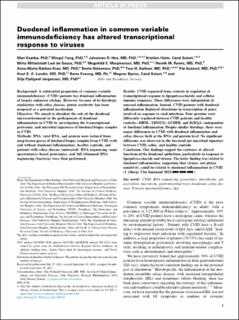| dc.contributor.author | Kaarbø, Mari | |
| dc.contributor.author | Yang, Mingyi | |
| dc.contributor.author | Hov, Johannes Espolin Roksund | |
| dc.contributor.author | Holm, Kristian | |
| dc.contributor.author | Sousa, Mirta | |
| dc.contributor.author | Macpherson, Magnhild Eide | |
| dc.contributor.author | Reims, Henrik Mikael | |
| dc.contributor.author | Kran, Anne-Marte Bakken | |
| dc.contributor.author | Halvorsen, Bente | |
| dc.contributor.author | Karlsen, Tom Hemming | |
| dc.contributor.author | Aukrust, Pål | |
| dc.contributor.author | Lundin, Knut | |
| dc.contributor.author | Fevang, Børre | |
| dc.contributor.author | Bjørås, Magnar | |
| dc.contributor.author | Jørgensen, Silje Fjellgård | |
| dc.date.accessioned | 2022-12-23T10:23:43Z | |
| dc.date.available | 2022-12-23T10:23:43Z | |
| dc.date.created | 2022-12-06T15:22:53Z | |
| dc.date.issued | 2022 | |
| dc.identifier.citation | Journal of Allergy and Clinical Immunology. 2022, . | en_US |
| dc.identifier.issn | 0091-6749 | |
| dc.identifier.uri | https://hdl.handle.net/11250/3039369 | |
| dc.description.abstract | Background A substantial proportion of common variable immunodeficiency (CVID) patients has duodenal inflammation of largely unknown etiology. However, because of its histologic similarities with celiac disease, gluten sensitivity has been proposed as a potential mechanism. Objective We aimed to elucidate the role of the duodenal microenvironment in the pathogenesis of duodenal inflammation in CVID by investigating the transcriptional, proteomic, and microbial signatures of duodenal biopsy samples in CVID. Methods DNA, total RNA, and protein were isolated from snap-frozen pieces of duodenal biopsy samples from CVID (with and without duodenal inflammation), healthy controls, and patients with celiac disease (untreated). RNA sequencing, mass spectrometry–based proteomics, and 16S ribosomal DNA sequencing (bacteria) were then performed. Results CVID separated from controls in regulation of transcriptional response to lipopolysaccharide and cellular immune responses. These differences were independent of mucosal inflammation. Instead, CVID patients with duodenal inflammation displayed alterations in transcription of genes involved in response to viral infections. Four proteins were differently regulated between CVID patients and healthy controls—DBNL, TRMT11, GCHFR, and IGHA2—independent of duodenal inflammation. Despite similar histology, there were major differences in CVID with duodenal inflammation and celiac disease both at the RNA and protein level. No significant difference was observed in the bacterial gut microbial signature between CVID, celiac, and healthy controls. Conclusion Our findings suggest the existence of altered functions of the duodenal epithelium, particularly in response to lipopolysaccharide and viruses. The latter finding was related to duodenal inflammation, suggesting that viruses, not gluten sensitivity, could be related to duodenal inflammation in CVID. Key words CVID RNA sequencing proteomics microbiome gut microbiota microbiota gastrointestinal tract duodenum celiac disease Primary immunodeficiency IgA | en_US |
| dc.language.iso | eng | en_US |
| dc.publisher | Elsevier | en_US |
| dc.rights | Navngivelse 4.0 Internasjonal | * |
| dc.rights.uri | http://creativecommons.org/licenses/by/4.0/deed.no | * |
| dc.title | Duodenal inflammation in common variable immunodeficiency has altered transcriptional response to viruses | en_US |
| dc.title.alternative | Duodenal inflammation in common variable immunodeficiency has altered transcriptional response to viruses | en_US |
| dc.type | Peer reviewed | en_US |
| dc.type | Journal article | en_US |
| dc.description.version | publishedVersion | en_US |
| dc.source.pagenumber | 0 | en_US |
| dc.source.journal | Journal of Allergy and Clinical Immunology | en_US |
| dc.identifier.doi | 10.1016/j.jaci.2022.09.029 | |
| dc.identifier.cristin | 2089582 | |
| cristin.ispublished | true | |
| cristin.fulltext | original | |
| cristin.qualitycode | 2 | |

